IRGC Member Gunned Down In Central Iran
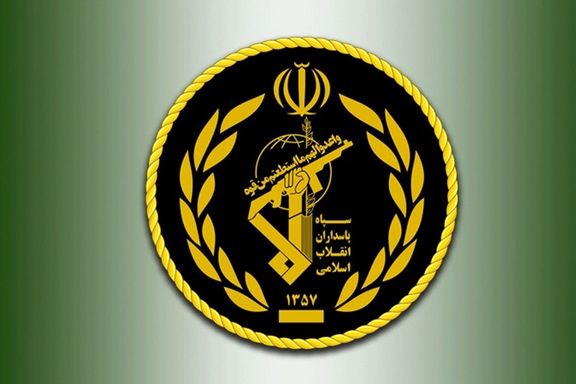
A top security official in Iran’s Esfahan province says a member of the Revolutionary Guard has been killed on Monday.

A top security official in Iran’s Esfahan province says a member of the Revolutionary Guard has been killed on Monday.
Deputy Governor of Esfahan, Mohammad Reza Jan-Nesari told ISNA that in the early hours of Monday one of the IRGC members, identified as Reza Dastani, was shot several times with a firearm on the way to work.
He also added that efforts are underway to identify and arrest the attackers, saying additional information about the intelligence measures taken will be announced later.
So far, authorities have not provided any information about Dastani’s rank or post in the IRGC or its Basij paramilitary unit. However, most personnel affiliated with the Revolutionary Guards have been involved in suppressing popular protests in the past 75 days.
The killing comes one week after Colonel Davoud Jafari, a senior aerospace commander lost his life in what Iran said was a roadside bomb blast on the outskirts of the Syrian capital, Damascus. He could have also been killed in one the frequent Israeli air strikes on Iranian bases in Syria.
The IRGC-affiliated Tasnim News Agency said Jafari served as one of the Iranian officials responsible for the seizure of two US Navy command boats carrying 10 US personnel in the Persian Gulf in January 2016.
Jafari was involved in the deployment of Iranian air defense systems in Syria and Lebanon.
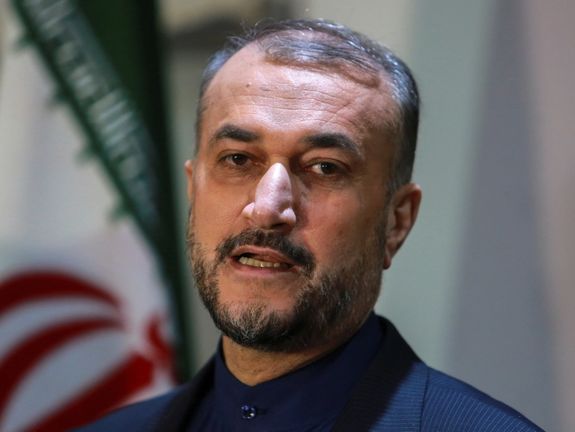
Iran’s foreign minister has met with and expressed appreciation to two interrogators and government TV figures who were recently sanctioned by the United States.
Hossein Amir-Abdollahian on Monday held a meeting with Ameneh Sadat Zabihpour and Ali Rezvani, two infamous ‘correspondents’ working for the state TV.
Amir-Abdollahian said “Western politicians claim to support free media, but they have shown in practice that their positions and statements are hypocritical and based on double-standards.”
US Treasury sanctioned six senior officials with Iran’s state-run media corporation this month over their role in broadcasting hundreds of coerced confessions of Iranians whose relatives died in government custody.
Treasury said Rezvani and Zabihpour had extracted and aired forced confessions in the style of news documentaries.
In 2020, Rezvani interviewed Ruhollah Zam, an Iranian journalist who was abducted, brought to Iran, and later executed by the regime.
US Treasury also added that Zabihpour has a long history of direct involvement in the broadcast of forced confessions of dual nationals, civil society activists, political prisoners, writers, and religious minorities.
In 2017, Zabihpour produced a documentary that tried to portray Nazanin Zaghari-Ratcliff, a British-Iranian woman held hostage by the IRGC on charges of “collaborating with foreign institutions” as a secret agent.
“The United States remains committed to supporting the Iranian people as they continue their peaceful protests. We will continue to hold Iranian officials and government institutions accountable for their human rights violations and their censorship of the Iranian people,” noted Under Secretary of the Treasury for Terrorism and Financial Intelligence Brian E. Nelson.
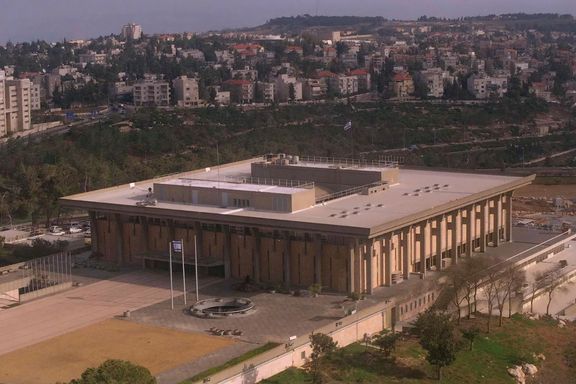
An Iranian news website has cited “resistance front” media, introducing the most important and sensitive locations in Israel which can be targeted in any future war.
Tasnim news agency, which is affiliated with Iran’s Revolutionary Guards, quoted a report by Al-Mayadeen network publishing Israel’s sensitive locations, including many civilian targets.
Al Mayadeen TV is a media outlet close to Iran-backed Lebanese militant organization Hezbollah.
Palestinian militant groups and other Iranian allies and proxies are often referred to collectively as the “Resistance” in Iranian official jargon.
The Knesset, prime minister’s office, ministries of foreign affairs, defense, finance, and communications are among the main locations listed as potential targets.
Nuclear sites and facilities including Tirosh Special Weapons Facilities, Israel Institute of Technology, the Rafael Arms Development Authority, and Weizmann Institute of Science are also mentioned in this report as the strategic centers.
The report also says that Israel heavily relies on a series of civilian airports that provide them with safe access to various countries in the world, saying these airports are a proper target for resistance front attacks. The airports are Ben Gurion in Lod, Haifa, and Ramon in southern Israel.
Some military bases like Ramat David in Haifa, Hatzerim and Nevatim Airbases in Be'er Sheva, as well as Urim intelligence-gathering installation are among non-civilian sites introduced as targets to “cripple Israelis’ lives.”

Many Iranians believe the football team in Qatar is not their national team, but belongs to a dictatorial regime that is ready to use it for its political goals.
In the 1998 World Cup, the American and Iranian teams faced each other for the first time after Iran's 1979 revolution.
The match was called "the most politically charged match in World Cup history" and ended with Iran's 2-1 victory. On the day of the match, my brother came to our house with two "Iran t-shirts," one for him and one for our father, who had recently been forced to immigrate to the United States.
Even though my father had taught physics and mechanics in Iran's high schools for nearly 50 years, had written textbooks, trained young teachers, and with the cooperation of some of his friends, founded Khorazmi Schools, one of the best private schools in Iran, he was forced to leave his country during his retirement.
After all my father had done to serve his country, the newly established Islamic regime penalized him severely. The regime confiscated his schools and arrested my brother and me for our anti-regime activities. My brother Bijan, who had received a ten-year sentence from the revolutionary courts for his political activities, and had spent more than six years behind bars, suddenly was executed in the 1988 massacre of the political prisoners and the Islamic Republic refused to give us his body or tell us where he was buried. The rest of us were forced to leave the country, and my father soon had to join us.

My father loved sports, especially soccer, and always memorized the players' names, the games' schedules, and the results. On that historic day, when he proudly sat in front of the TV to watch the game, I asked him, "Will you support Iran's regime team in this match?" He answered, "It doesn't matter to me which team wins. Iran is my homeland, but America has sheltered me, so whoever wins, I will feel victorious."
That day, my father's answer was not convincing because I had endured pain and suffering as a woman living in an Islamic country with a gender-apartheid regime. Immediately after the revolution, I was forced to go to an all-girls segregated school instead of a "mixed elementary school." The content of schoolbooks was changed to Islamic propaganda. I was forced to wear hijab, long dresses, and wide-leg pants in dark colors to cover my body's curves. All my human rights, including the right to divorce, the right to custody of my children, the right to equal inheritance, the right to testify in court, the right to leave the country, the right to study in a series of disciplines, the right to participate in a series of sports, the right to enter sports stadiums, the right to mingle with the opposite sex, the right to run for dozens of important positions in the country, including the presidency, were taken from me.
I didn't see this soccer team as my country's team, and I hated the Islamic Regime's flag and its anthem. That day, I had no interest in the Islamic Republic team winning, but I was in the minority. The passion for soccer and the World Cup mesmerized everyone. They had forgotten that soccer and the world events are a place for dictators to validate their existence, normalize their oppressive regimes, and spread their propaganda.
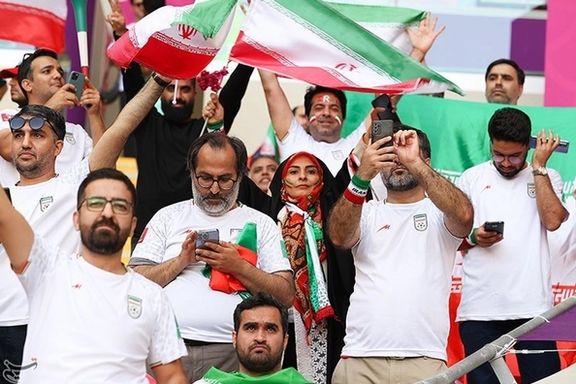
After 24 years, we are again at a historical moment, and on Tuesday, November 29, 2022, the teams of the Islamic Regime of Iran and the United States will face each other. In these 24 years, the regime's violence has reached a much wider range of people. If in the 1980s, the Islamic Republic committed crimes behind the walls of prisons and away from the eyes of the people, now it is shooting protesters in the streets in broad daylight, and cell phone cameras are recording these crimes.
In the 1980s, no one heard the voices of the prisoners who were executed and dumped secretly in individual or mass graves, but today we know the names of many of those killed in the recent protests. Due to access to the victims' social media accounts and because of satellite TVs and other forms of digital media, we know about the victims' interests, their lifestyles, and even the music they listened to. Many of the soccer players in the 1998 match, such as Ali Daei, Mahdi Mahdavi Kia, Karim Bagheri, Ahmad Reza Abedzadeh, etc., are standing by the people now and support the Iranian people's revolution against this brutal Regime.
Today, we should all boycott this World Cup and the Islamic regime's team, which instead of being a "national team," is an "Islamic regime team" and represents a child-killing gender apartheid political system, and hope that it will be the loser of this tournament. Every time the flag of the Islamic Republic is waved in international gatherings and its disgraceful anthem is played; it is a blow to the freedom movement of the Iranian people. In addition, the host of the World Cup, Qatar, is not qualified to host these competitions at all. Not only is it unclear how FIFA granted the hosting of this World Cup to a small country like Qatar, which has no history of football at all, but also Qatar's abuse of migrant workers, not paying their wages, the death of thousands of people during the construction of Qatar's stadiums, and discrimination against women and LGBTQ community makes this country ineligible to host the World Cup.
Although I have boycotted these games and will not watch them, I sincerely hope that the US team wins on Tuesday so that we no longer see the flag of a child-killing, gender-apartheid regime with no respect for human life and human dignity, waiving in the air.
The last victory of the Islamic regime against Wales team was celebrated by its repressive security forces in the street, the same forces that, until hours earlier, were killing innocent people with batons, guns, and bullets. The same forces that are committing crimes against humanity in Baluchistan and Kurdistan. Regime hired immigrants from other countries to cheer its team in Qatar's stadiums. It used all the intelligence capabilities and police forces of Qatar to prevent its opponents from entering the stadiums and silenced their voices. A team with this background does not deserve victory.
The real Iranian National Team is the young people willing to die in the streets for freedom and secularism. Our national team is imprisoned in Evin and other prisons in Iran. Our heroes are Nilofar Hamedi, Zainab Mousavi, Elaha Mohammadi, Hossein Ronaghi, Toomaj Salehi, Majid Tavakoli, Arash Sadeghi, Sepideh Qolian, Golrokh Iraei, Zeynab Jalali and thousands of others who are ready to give their lives for their country, for freedom of Iran, and a better tomorrow.
Opinions expressed by the author are not necessarily the views of Iran International
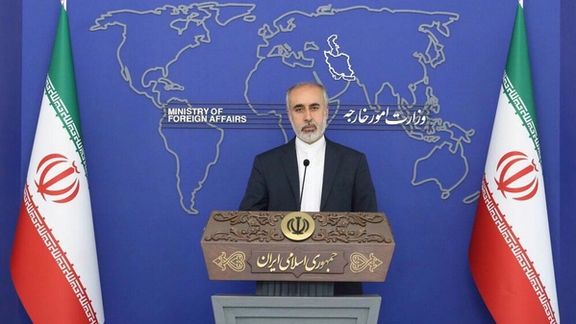
Iran’s foreign ministry has summoned Germany’s ambassador in Tehran for the third time in a month to protest “interventionist” remarks by German officials.
Tehran says the German envoy Hans-Udo Muzel was also summoned for Berlin’s key role in holding a UN Human Rights Council special session on Iran last week.
Iran’s foreign ministry spokesman Naser Kanaani said in this meeting, Tehran “strongly protested against the interventionist and baseless statements of the German authorities.”
“The German ambassador was also told that the recent resolution of the special meeting of the UN Human Rights Council is a wrong step based on a completely political and instrumental use of human rights and is fundamentally rejected. The Islamic Republic of Iran will not cooperate with any mechanism defined by it,” added Iran’s foreign ministry.
The ministry also noted that it has warned the German ambassador that Berlin and other European governments who support “the unilateral sanctions of the United States” are not “qualified to raise human rights claims”.
The UN Human Rights Council voted Thursday to launch an independent investigation into Iran's deadly repression of protests, that has killed more than 400 civilians.
The 35th special session of the Human Rights Council was held following an official request submitted on November 11 by Germany and Iceland, as well as the support by over 40 other states.
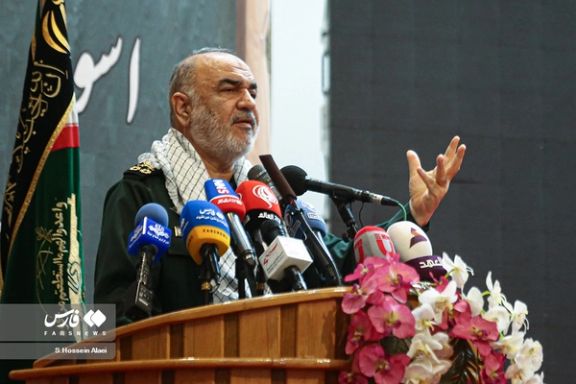
Iran has once again threatened the United States, Israel and their allies saying that “they will be defeated in the World War they have waged against Iran.”
Revolutionary Guard Commander Hossein Salami said Sunday that “We are determined to stand against them. We will turn this new battle scene, this huge sedition scene, and this world war into a burial ground for America, Israel and their allies,” singling out Saudi Arabia, the United Kingdom, France and Germany.
During his visit to Zahedan in the southeast after weeks of antigovernment protests in the mostly Sunni region, Salami once again upped the ante against Israel saying the “Zionist” regime would collapse.
“We will bury plots to target Iran, just as we've buried Israeli and American plots in the past,” he added.
Salami’s visit to Sistan and Baluchestan province comes at a time the regime has been in hot water there within the past weeks after killing least 100 people,including a nine-year-old girl during anti-government protests.
The hardliner commander labeled protesters as “non-believers”, saying, “Today on one side is the Front of Kufr [disbelief] with all its might and on the other is the Front of Islam, one cannot stand in the middle, the lines are clear, one side is led by America and Israel and the other side is led by the Supreme Leader of the revolution [Ali Khamenei] and believers and revolutionaries.”
His remarks come a day after Khamenei warned demonstrators to bring the movement to an end and showed a green light for more crackdown.
However, some believe Salami’s comments on “unity” in a region with Sunni majority is the last attempt by the government to pacify the situation there while it is already under pressure with the situation in the northwest Kordestan province.
In early November the leader of Iran’s largely Sunni Baluch population in the southeastern province of Sistan and Baluchestan strongly criticized the authorities for their brutality in the province, holding Supreme Leader Khamenei responsible for the violence against Sunnis and other protesters.
“A government with which people are dissatisfied is no good and has to be toppled,” Molavi Abdolhamid stated, demanding the release of all those arrested in the protests across the country.
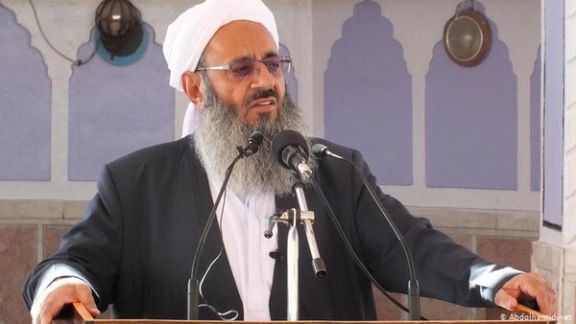
He also blasted more than 200 members of Iran’s parliament who demanded the death sentence for some protesters. “In Khamenei’s rule there is no freedom. Which political party or group is free? We have neither freedom of speech, nor freedom of media,” he added in unprecedented criticism against the 83-year-old ruler.
The influential Friday Prayer Imam of Zahedan also called for an internationally monitored referendum, saying by killing and crackdown the government cannot push back a nation.
Worried by the developments in the province, Khamenei sent his representatives to hold talks with local Sunni leaders.
State media said Mohammad-Javad Haj-Ali Akbari was carrying “Supreme Leader’s greetings to the people of Sistan and Baluchestan” and to let them know that the recent events in the province have “saddened and upset him”.
However, what some media in Tehran reported about Haj-Ali Akbari’s statements, showed that his remarks had double meaning. While he spoke about resolving misunderstandings, he also said he delivered “serious messages to some” to be careful about their behavior.
With Abdolhamid clearly expressing the demands of the Baluch people and condemning the brutal killing of citizens in the visit with Khamenei’s representative, it seems Khamenei this time has sent his hardliner IRGC Commander to show an iron fist to the people, signaling if they continue protests, more clampdowns are on the way.